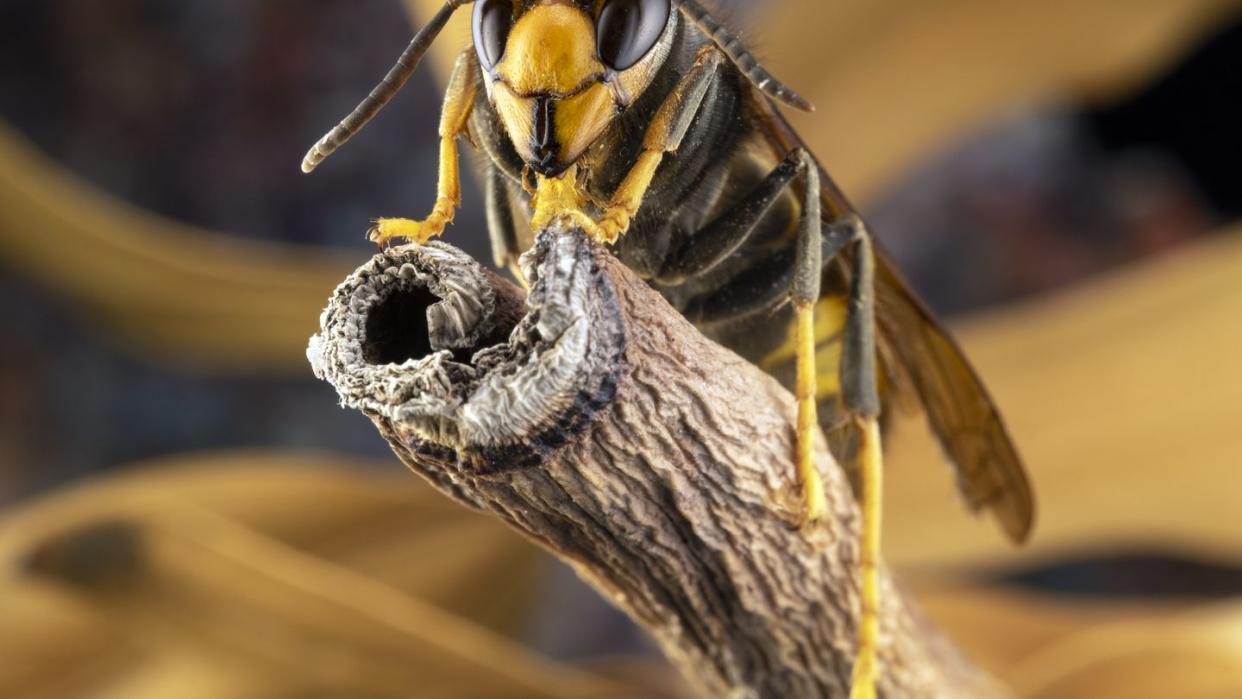Oh, Fun, the Murder Hornet’s Cousin Is Now in the U.S.

A live yellow-legged hornet found in Georgia is the first to be discovered in the United States.
A cousin of the larger northern giant hornet, the yellow-legged hornet also preys on honeybees.
Originally from southeast Asia, the yellow-legged hornet can grow nests with an average of 6,000 workers.
Late last summer, scientists found the yellow-legged hornet—officially a Vespa velutina—near Savannah, Georgia, putting the American agricultural community on alert. It’s much the same reaction that the discovery of the northern giant hornet—the Vespa mandarinia, also called the Asian giant hornet or murder hornet—in Washington elicited in 2019.
“The yellow-legged hornet poses a threat to honeybees and other pollinators in our state,” states the Georgia Department of Agriculture in a news release. “It is imperative that these invasive pests are tracked and eradicated.”
Native to the tropical and subtropical areas of southeast Asia, the yellow-legged hornet worker is often around half the size of a murder hornet. The queen is roughly three-quarters the size of its cousin species. Named for its distinctive coloring, the legs of the hornet are partially or primarily yellow, and the colors on the bodies and heads of the hornets can vary.
Known as a social wasp species, the yellow-legged hornets’ egg-shaped paper nests are commonly found in trees and house an average of 6,000 workers. To feed these workers, the hornets hunt insects. And that includes pollinators like the honeybee.
“This species happens to prefer honeybees,” according to the University of Florida’s extension service, as reported by NPR.
Add the larger size of the yellow-legged hornet to their strength and thick exoskeleton, and you usually don’t get a good outcome for the bee when it’s attacked by a hornet. Clemson University’s Land-Grant Press extension calls the Vespa varieties “true hornets” and “exceptional predators.”
“Most hornets prey on other insects’ larvae, and many species of hornets target nests of other social bees and wasps,” Clemson experts wrote. To make it all happen, the hornets descend upon a bee nest, kill off the workers defending the nest, and feast on the larvae—a true devastation of an entire local honeybee existence.
Also dubbed the bee hawk for the way it attacks hives with dive-bomb style advances, if the yellow-legged hornet does gain a foothold in the United States, that spells trouble for bees and the agricultural community that feeds the nation.
The Atlanta Journal-Constitution notes that, in Georgia alone, pollinator-dependent crops are worth an estimated $430 million annually. On top of that, Georgia has a beekeeping industry that stocks apiaries around the country, shipping insets to farms for crop pollination.
Hunting down the insects is now the focus. So far, no full colonies of the hornets have been found—just two individual hornets on the same property. The two hornets were spotted near the Port of Savannah, leading University of Georgia scientist and honeybee expert Keith Delaplane to believe (as he told the newspaper) that the insects traveled to the U.S. on a container ship. Along with a love of attacking bees, the yellow-legged hornet enjoys a rotting fish, so officials plan to lure any additional hornets with feeding stations and then track them back to any potential nests.
In Washington, the state’s Department of Agriculture used a similar strategy after locating murder hornets. Upon luring the hornets, the team used radio transmitters to then locate and trap the pests. So far in 2023, there have been no sightings of the murder hornet in Washington.
Of course, the yellow-legged hornet may write a different story, as Europe was unsuccessful in its efforts to cleanse the continent of them—a nearly two-decade effort, at this point.
“This guy is bad news for honeybees,” Delaplane told the AJC. “It’s a relentless predator and we have nothing like it in this country.”
You Might Also Like


